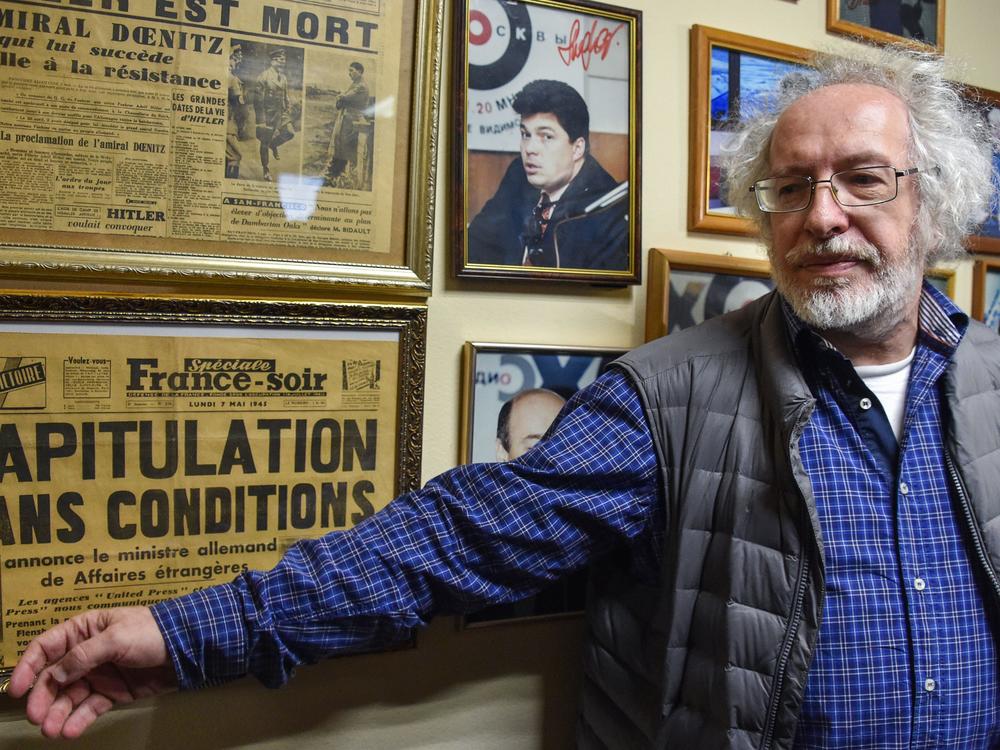Section Branding
Header Content
A top Russian journalist found a pig's head and antisemitic slur left at his door
Primary Content
A decorated pig's head and antisemitic slur were left outside the Moscow apartment of a leading Russian journalist — the latest in a series of acts of intimidation inside Russia aimed at critics of the Kremlin's invasion of Ukraine.
Alexei Venediktov, the longtime editor of Echo of Moscow radio before its forced closure earlier this month, reported the incident at his doorstep on social media Thursday.
In one photo he posted, a pig's head with a wig lies on the floor. Ukraine's coat of arms is also fixed to his door with an antisemitic slur attached to it.
"This in the country that defeated fascism," Venediktov wrote on his channel on the Telegram messaging app. "Why not just fix a six-pronged star to my apartment door?" he added, in a sarcastic reference to requirements for Jewish homes to be marked with a Star of David during the Holocaust.
Venediktov later published a still image from surveillance video from his apartment complex that appeared to show a figure dressed as a food delivery worker coming to his door. The food company, he said, later contacted him to say the uniform was retired several years ago.
The incident follows a controversial speech by President Vladimir Putin last week in which he compared critics of the war to "traitors" and "scum" and said society would benefit from a "cleansing" of Western-leaning Russians.
Tens of thousands of Russians have fled the country in protest over their government's actions, with many fleeing pressure by the state.
Several journalists and opposition activists have reported their homes being marked with the word "traitor" or a "Z" — the letter which the Kremlin has seized as a symbol for the operation in Ukraine.
Russian forces are using the letter to mark their vehicles in the field of battle, and to rally the public behind the mission in Ukraine.
Echo of Moscow (known in Russian as Ekho Moskvy) radio was founded in 1990, near the end of the Soviet Union, and emerged as a symbol of the new Russia's press freedoms.
Earlier this month, Russia's communication watchdog Roskomnadzor blocked the station's website, accusing it of spreading "deliberately false information about the actions of Russian military personnel."
Within hours, Echo's FM frequency was cut and its board of directors voted to liquidate the station altogether. Despite Echo's liberal reputation, the station was under the media wing of the state-controlled energy corporation Gazprom.
Vendiktov insists Echo was punished for reporting the truth about the war in Ukraine.
Russia's government censors had previously instructed outlets to use only official Defense Ministry information about its offensive in Ukraine and required that journalists avoid words such as "invasion" or "war" and instead call it a "special military operation."
Today, Echo's FM frequency has been given over to the state-run Sputnik radio.
Echo of Moscow hosts have continued some programming under a new name, Zhivoi Gvozd, or The Living Nail, on YouTube.
This story originally appeared in the Morning Edition live blog.
Copyright 2022 NPR. To see more, visit https://www.npr.org.

